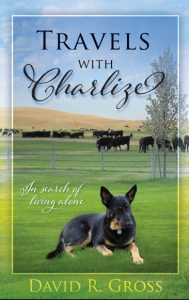
Travels with Charlize
By David R. Gross
You’ll enjoy traveling with
Charlize around the western United States.
Charlize is a lovely German shepherd rescue dog who’s all personality
from the tip of her tail to the tip of her wet nose. The author adopts Charlize after he’s lost
the love of his life to cancer, his wife of almost 53 years Rosalie.
The author hit the road on a
journey to find what there is left in life for him, seeking what to do with the
rest of his years. He was in search of
living alone, supported by man’s best friend at his side. It’s been said that “the world would be a
nicer place if everyone had the ability to love as unconditionally as a dog.” Charlize is an enthusiastic friend, an
excellent listener, great at fetch, and has an innate sense to comfort when it’s
needed most. A reader is reminded of
John Steinbeck’s book Travels With
Charley. As John Steinbeck said, “a
sad soul can kill you quicker, far quicker, than a germ.” Travels
with Charlize is good medicine for a sad soul.
This book is a compilation of David
Gross’ blogs, which makes it such a personal way to unfold his story. The man and his dog began on their first of
several journeys, from Washington State to California at the beginning of the
book. They’re off to visit family and
friends towing a camping trailer nicknamed “Frog,” pulled by “Old Blue” a Dodge
Ram truck. That’s certainly a new life
for a Veterinarian who also taught and did research in cardiovascular
physiology for more than thirty years.
The author’s descriptive passages
are entrancing and especially poignant when they include his nostalgic memories. He compares today’s destinations with his
memories of those places during boyhood and as a young man. As a reader you’ll be surprised when the
author reveals what big, visible changes time has brought. Although their journeys are quite different,
there are interesting parallels with John Steinbeck’s book, including each
author’s insights into the America they see.
At one point John Steinbeck said, “I wonder why progress looks so much
like destruction.”
Like Steinbeck, our author also finds much
beauty to marvel at along the way, and wonderful people. Charlize turns out to be a natural friend
maker and a magnet for attention.
Charlize is also a bit of a daredevil, at one point curiosity leading
her onto the verge of unstable cliffs for a better look. The book is dotted throughout with wonderful
pictures of Charlize and of trip highlights.
None of us know what life holds
around the corner. When you have no map,
and your GPS isn’t working, you’re fortunate in life if you have a loving,
compassionate companion by your side. This
heartwarming tale shows one man’s search to find his way, with his tail wagging
friend.
Thereby hangs a tail and a tale .
. . .
